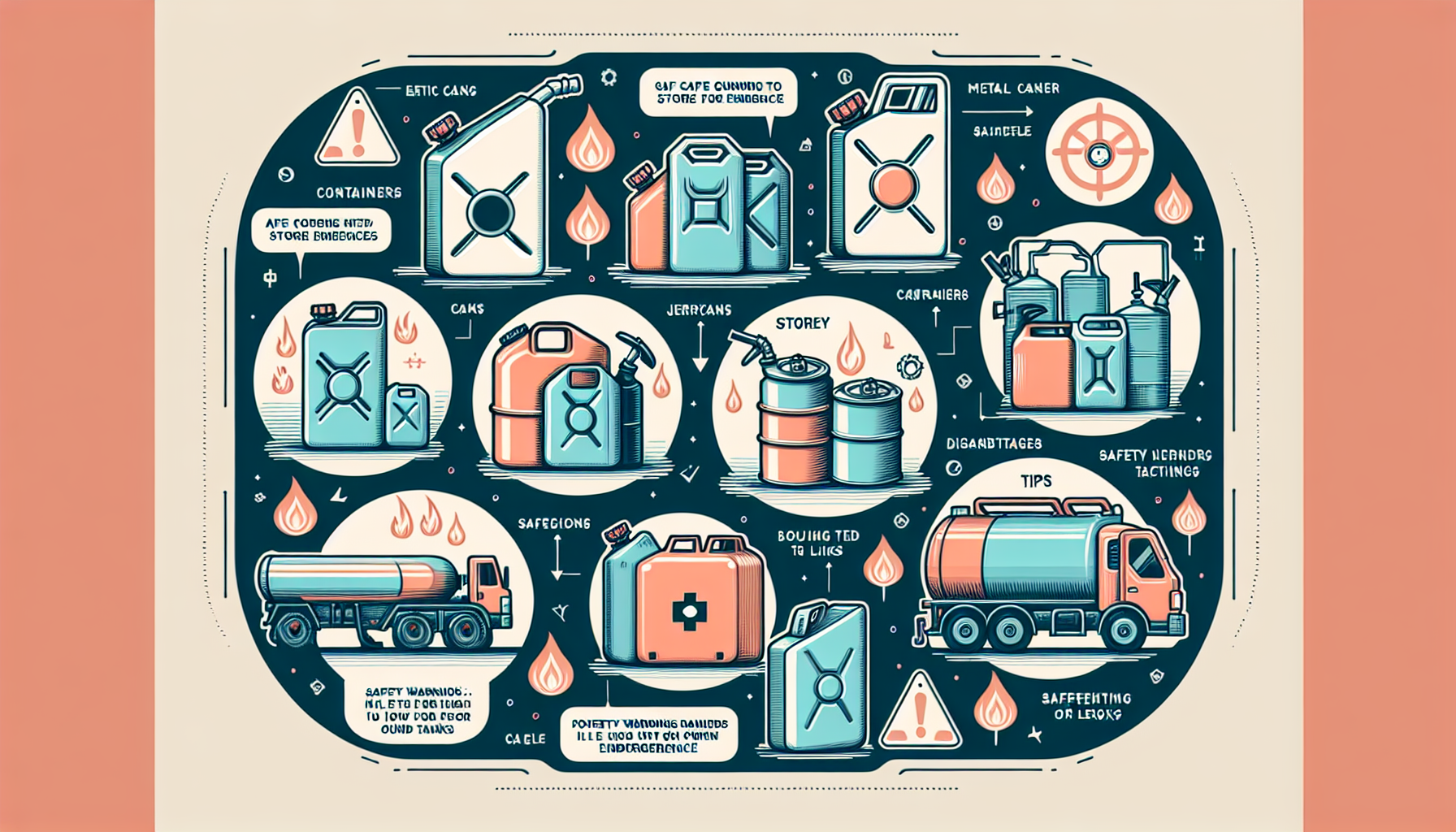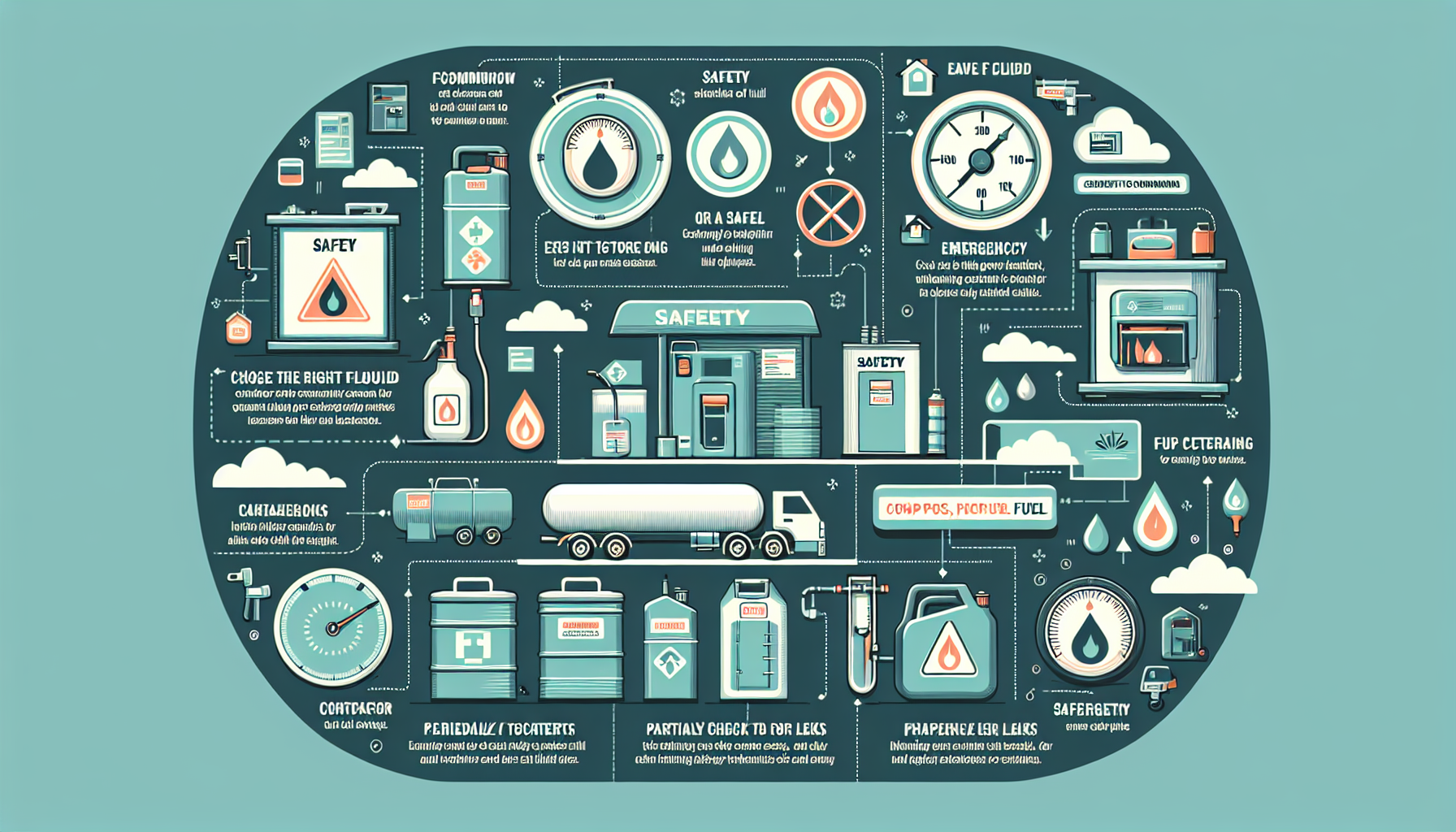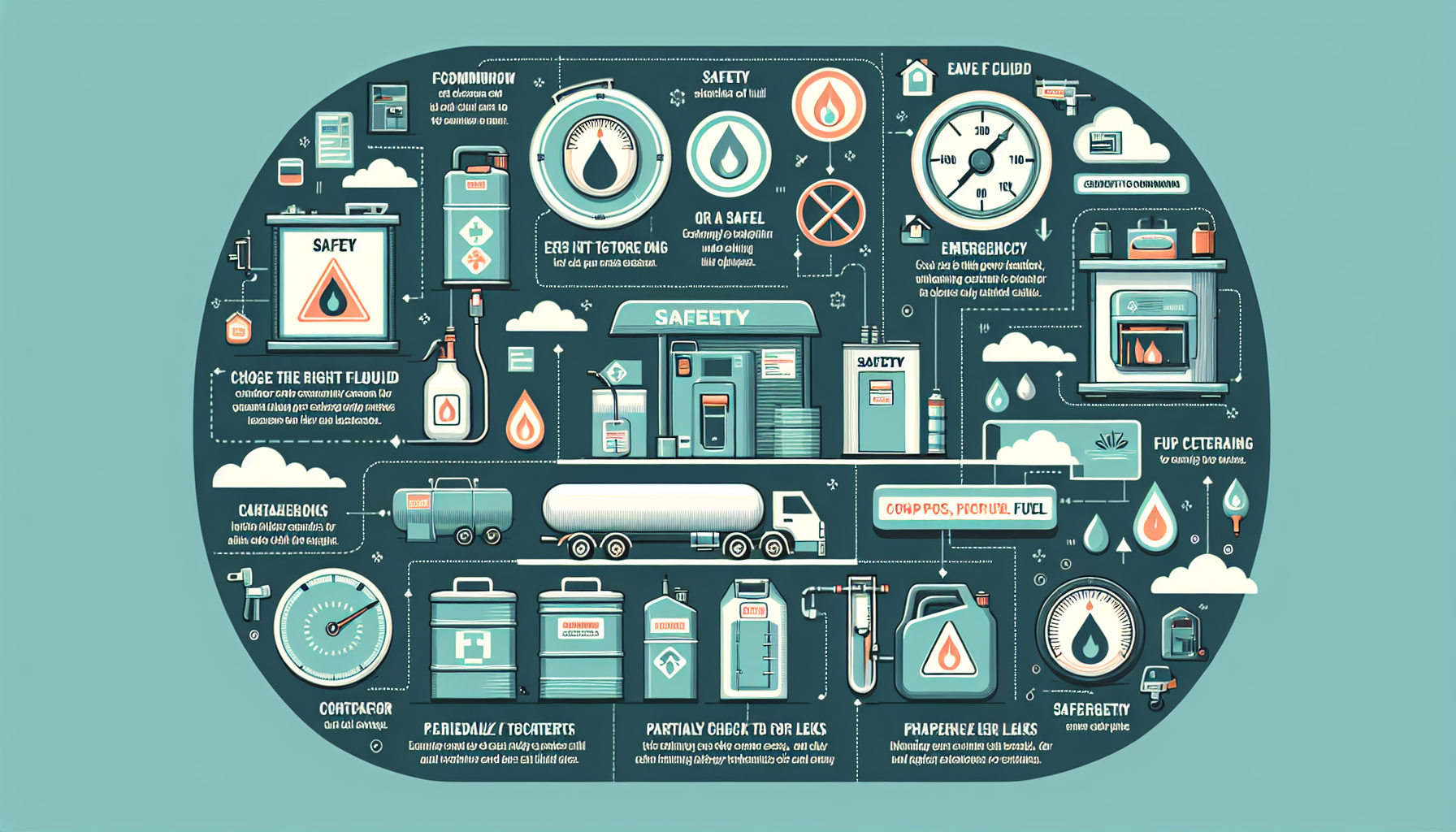In times of emergencies, it is crucial to be well-prepared and equipped with the knowledge of how to safely store fuel. Whether it be for power generators, vehicles, or other essential machinery, understanding the safest methods ensures not only your safety but also the protection of your surroundings. This article explores the various strategies and precautions you can take to ensure that you store fuel responsibly and securely, providing you with the peace of mind you need during unforeseen circumstances.
Proper Storage Containers
When it comes to storing fuel for emergencies, it’s crucial to use the proper storage containers to ensure safety and prevent accidents. There are a few options available, depending on your needs and the type of fuel you’re storing.
Metal Gas Cans
Metal gas cans are a popular choice for storing fuel due to their durability and resistance to impact and fire. They are typically made of steel or aluminum, which makes them sturdy and safe. Metal gas cans often come with built-in safety features such as flame arrestors, which prevent ignition of the fuel. These cans are suitable for storing gasoline, diesel, and propane.
Approved Plastic Gas Containers
Plastic gas containers are another common option for storing fuel. When choosing plastic containers, it’s essential to select ones specifically designed and approved for fuel storage. These containers are typically made of high-density polyethylene (HDPE) and have undergone rigorous testing to ensure they can safely handle the fuel. Look for containers with a tight-fitting cap and a spill-proof design. Plastic gas containers are suitable for gasoline and diesel storage.
Safety Cans
Safety cans are specialized containers designed to provide an extra layer of protection when storing fuel. They are often made of heavy-duty steel and feature a self-closing lid with a flame arrestor. Safety cans are engineered to prevent spills, leaks, and flammable vapor from igniting. These cans are ideal for gasoline and diesel storage.
Fuel Types
Before deciding on storage methods, it’s essential to understand the different fuel types and their specific storage requirements.
Gasoline
Gasoline is highly flammable and should be stored with caution. It’s crucial to keep gasoline away from ignition sources and heat sources to prevent accidents and fires. Gasoline should be stored in a well-ventilated area in approved containers, such as metal gas cans or plastic gas containers.
Diesel
Unlike gasoline, diesel fuel is less flammable and has a higher flashpoint. However, it still requires proper storage to prevent accidents. Diesel can be stored in metal gas cans, plastic gas containers, or safety cans. It’s important to keep diesel fuel away from heat sources and sunlight, as prolonged exposure can degrade its quality.
Propane
Propane is commonly used for heating, cooking, and fueling vehicles. When storing propane, it’s crucial to follow specific safety guidelines. Propane should always be stored upright in a well-ventilated area. It’s recommended to store propane cylinders outdoors or in properly ventilated storage areas to prevent the buildup of flammable vapors.

Location for Storage
Choosing the right location for fuel storage is vital to minimize the risk of accidents and maintain safety standards.
Above Ground
Storing fuel above ground provides several advantages, including easier accessibility for refueling and maintenance. Above-ground storage tanks or containers should be placed on stable, level surfaces away from buildings, combustible materials, and ignition sources. Adequate spacing between containers is crucial to prevent the spread of fire in the event of an accident.
Underground
Underground storage tanks are an option for larger fuel storage needs. They offer space-saving advantages and are less visible. However, underground storage tanks require specialized installation and regular maintenance to prevent leaks or soil contamination. It’s essential to follow local regulations and obtain the necessary permits for underground storage tanks.
Distance from Ignition Sources
Regardless of whether fuel is stored above ground or underground, it’s crucial to maintain a safe distance from ignition sources. Ignition sources can include open flames, electrical equipment, and heating systems. Fuel storage areas should be clearly marked and kept well away from potential sources of ignition to minimize the risk of fires or explosions.
Ventilation
Proper ventilation is necessary when storing fuel to minimize the buildup of flammable vapors and maintain a safe environment.
Proper Ventilation Systems
When storing fuel indoors or in enclosed areas, it’s essential to have a proper ventilation system in place. Ventilation systems help remove potentially dangerous vapors and maintain a safe air quality within the storage area. Adequate ventilation can be achieved through the use of exhaust fans or natural ventilation through doors/windows.
Outdoor Storage
Storing fuel outdoors provides natural ventilation, reducing the risk of flammable vapor accumulation. However, it’s still important to ensure that outdoor storage areas are well-ventilated and away from areas with high foot traffic or sources of ignition. Properly designed canopies or sheds can also provide additional protection against the elements.
Avoiding Confined Spaces
When choosing a storage area, it’s crucial to avoid confined spaces that may trap flammable vapors. Confined spaces can increase the risk of oxygen depletion and the potential for explosions. Always opt for well-ventilated areas and avoid storing fuel in enclosed spaces such as basements, crawlspaces, or small storage rooms without proper ventilation.

Preventing Evaporation
Evaporation of fuel can lead to safety hazards, including the buildup of flammable vapors. Preventing evaporation is essential to maintain a safe storage environment.
Tightly Sealed Containers
Using tightly sealed containers is critical to prevent fuel evaporation. Ensure that the lids or caps of your fuel containers fit securely and create a tight seal. This will help minimize the release of vapor into the surrounding area and reduce the risk of accidents.
Mindful Filling and Cap Closure
When refueling containers, it’s important to be mindful and avoid overfilling. Overfilling can lead to spillage and vapor release. Additionally, always close the lids or caps tightly after each use to maintain a proper seal. Paying attention to fueling practices and proper cap closure can significantly reduce the risk of evaporation.
Storage Temperature Considerations
Fuel evaporation can be influenced by temperature changes. It’s important to store fuel in a cool, well-ventilated area to help minimize the rate of evaporation. Avoid storing fuel in direct sunlight or areas with high temperatures, as these conditions can accelerate evaporation.
Fire Safety Measures
Implementing fire safety measures when storing fuel is crucial to minimize the risk of fires and ensure the safety of individuals and property.
Fire Extinguishers
Having fire extinguishers readily available in fuel storage areas is essential. Choose extinguishers suitable for Class B fires, which include fires involving flammable liquids such as gasoline, diesel, and propane. Regularly inspect and maintain fire extinguishers to ensure they are in proper working condition.
Fireproof Storage Solutions
Consider using fireproof storage solutions such as fire-resistant cabinets or vaults to enhance safety. These storage options are designed to withstand high temperatures and prevent the spread of fire. Fireproof containers provide an additional layer of protection in case of accidents or emergencies.
Avoid Open Flames
To minimize the risk of fires, it’s crucial to avoid open flames near fuel storage areas. Open flames, including smoking materials and lit candles, should be strictly prohibited. Implement clear signage and safety protocols to ensure that individuals are aware of the no-smoking policy and the potential hazards of open flames.

Secure Storage
Maintaining the security of your fuel storage area is vital to prevent unauthorized access, theft, and potential accidents.
Locked Containers
Keep your fuel containers and storage areas locked to restrict access. This helps prevent tampering and ensures that only authorized personnel can access the fuel. Locking containers can deter theft and unauthorized use, contributing to overall safety and security.
High-Quality Padlocks
Investing in high-quality padlocks adds an extra layer of security to your fuel storage containers. Look for padlocks specifically designed for outdoor use and choose ones that are resistant to cutting, picking, or drilling. Regularly inspect and maintain padlocks to ensure their effectiveness.
Surveillance Systems
Installing surveillance systems, such as security cameras, in your fuel storage area can help deter theft and provide evidence in case of any incident. Visible security measures can act as a deterrent and enhance overall security. Ensure that surveillance systems are properly maintained and regularly monitored.
Regular Maintenance
Regular maintenance is crucial to ensure the longevity of your fuel storage containers and prevent accidents.
Fuel Rotation
To maintain fuel quality and prevent degradation, practice fuel rotation. Use the oldest fuel first and replenish with fresh fuel. This practice helps prevent the buildup of contaminants and ensures that your stored fuel remains usable during emergencies. Regularly check expiration dates of fuel containers to ensure that fuel is used before it becomes unstable or ineffective.
Inspections and Leak Detection
Regularly inspect your storage containers for signs of damage, corrosion, or leaks. Conduct visual inspections to identify any potential issues and address them promptly. Consider using leak detection systems or absorbent materials to monitor for any fuel leaks. Any signs of leaks should be immediately addressed to prevent environmental damage and accidents.
Proper Disposal of Old Fuel
Proper disposal of old or degraded fuel is essential to protect the environment and prevent accidents. Follow local regulations and guidelines for fuel disposal. Contact your local waste management facility or recycling center to learn about proper disposal methods in your area.

Training and Education
Proper handling and storage education, as well as emergency response training, are crucial for maintaining a safe fuel storage environment.
Proper Handling and Storage Education
Ensure that all personnel involved in fuel storage and handling receive proper training and education. This includes understanding fuel properties, proper storage techniques, safety protocols, and emergency procedures. Regularly reinforce and update training to ensure that everyone remains knowledgeable and prepared.
Emergency Response Training
Emergency response training is essential for individuals responsible for fuel storage areas. Training should cover emergency response procedures, including evacuation plans and proper use of fire extinguishers. Regular drills and simulations can help ensure that individuals are prepared to handle emergencies effectively.
Safety Guidelines
Establish clear safety guidelines and protocols for fuel storage. Ensure that these guidelines cover topics such as proper container labeling, no-smoking policies, and reporting procedures for leaks or spills. Regularly communicate and reinforce safety guidelines to create a culture of safety within your organization.
Legal Considerations
Compliance with local regulations and obtaining the necessary permits and licenses is crucial when storing fuel.
Compliance with Local Regulations
Stay updated on local regulations regarding fuel storage and ensure compliance at all times. Regulations can vary based on the quantity of fuel stored, the type of fuel, and the specific storage methods used. Failure to comply with regulations can result in fines, legal consequences, and increased safety risks.
Permits and Licenses
Depending on the location and quantity of fuel stored, permits and licenses may be required. Contact your local fire department or the appropriate regulatory agency to determine which permits or licenses are necessary. Obtain the required documentation and ensure that permits are renewed as required by law.
Transportation Rules
If fuel needs to be transported for storage purposes, it’s essential to comply with transportation rules and regulations. Properly label fuel containers, secure them during transportation, and follow established protocols for fuel transportation. Be aware of any restrictions or requirements regarding transportation routes and vehicle specifications.
In conclusion, storing fuel for emergencies requires careful consideration of proper storage containers, fuel types, storage location, ventilation, evaporation prevention, fire safety measures, secure storage, regular maintenance, training and education, and legal considerations. By following these guidelines and prioritizing safety, you can ensure that your fuel storage is both efficient and secure when emergencies arise.


